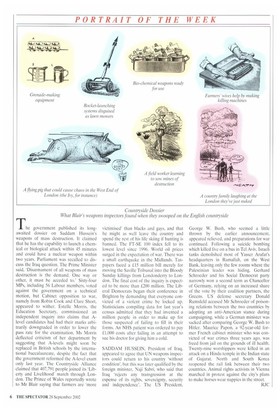T he government published its longawaited dossier on Saddam Hussein's weapons
of mass destruction. It claimed that he has the capability to launch a chemical or biological attack within 45 minutes and could have a nuclear weapon within two years. Parliament was recalled to discuss the Iraq question. The Prime Minister said, 'Disarmament of all weapons of mass destruction is the demand. One way or other, it must be acceded to.' Sixty-four MPs, including 56 Labour members, voted against the government on a technical motion, but Cabinet opposition to war, namely from Robin Cook and Clare Short, appeared to wither. Estelle Morris, the Education Secretary, commissioned an independent inquiry into claims that Alevel candidates had had their marks arbitrarily downgraded in order to lower the pass rate for the examination. Ms Morris deflected criticism of her department by suggesting that A-levels might soon be replaced in British schools by the international baccalaureate, despite the fact that the government reformed the A-level exam only last year. The Countryside Alliance claimed that 407,791 people joined its 'Liberty and Livelihood' march through London. The Prince of Wales reportedly wrote to Mr Blair saying that farmers are more victimisedthan blacks and gays, and that he might as well leave the country and spend the rest of his life skiing if hunting is banned. The FT-SE 100 index fell to its lowest level since 1996. World oil prices surged in the expectation of war. There was a small earthquake in the Midlands. Taxpayers faced a £15 million bill merely for moving the Saville Tribunal into the Bloody Sunday killings from Londonderry to London. The final cost of the inquiry is expected to be more than £200 million. The Liberal Democrats began their conference in Brighton by demanding that everyone convicted of a violent crime be locked up. Statisticians compiling data for last year's census admitted that they had invented a million people in order to make up for those suspected of failing to fill in their forms. An NHS patient was ordered to pay £1,000 costs after failing in an attempt to sue his doctor for giving him a cold.
SADDAM HUSSEIN, President of Iraq, appeared to agree that UN weapons inspectors could return to his country 'without condition', hut this was later qualified by the foreign minister. Naji Sabri, who said that Iraq 'rejects any transgression at the expense of its rights, sovereignty, security and independence'. The US President, George W. Bush, who seemed a little thrown by the earlier announcement, appeared relieved, and preparations for war continued. Following a suicide bombing which killed five on a bus in Tel Aviv. Israeli tanks demolished most of Yasser Arafat's headquarters in Ramallah, on the West Bank, leaving only the few rooms where the Palestinian leader was hiding, Gerhard Schroeder and his Social Democrat party narrowly won a second term as Chancellor of Germany, relying on an increased share of the vote by their coalition partners, the Greens, US defense secretary Donald Rumsfeld accused Mr Schroeder of poisoning relations between the two countries by adopting an anti-American stance during campaigning, while a German minister was sacked after comparing George W. Bush to Hitler. Maurice Papon, a 92-year-old former French cabinet minister who was convicted of war crimes three years ago, was freed from jail on the grounds of ill health. Twenty-nine worshippers were killed in an attack on a Hindu temple in the Indian state of Gujarat. North and South Korea reopened the rail link between their two countries. Animal rights activists in Vienna marched in protest against the city's plans to make horses wear nappies in the street.
RJC


































































































 Previous page
Previous page